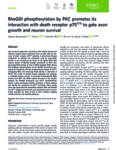The medial habenula (mHb) is an understudied small brain nucleus linking forebrain and midbrain structures controlling anxiety and fear behaviors. The mechanisms that maintain the structural and functional integrity of mHb neurons and their synapses remain unknown.
In this study, we used spatiotemporally controlled Cre-mediated recombination in adult mice, and found that the glial cell–derived neurotrophic factor receptor alpha 1 (GFRα1) is required in adult mHb neurons for synaptic stability and function. mHb neurons express some of the highest levels of GFRα1 in the mouse brain, and acute ablation of GFRα1 results in loss of septo-habenular and habenulo-interpeduncular glutamatergic synapses, with the remaining synapses displaying reduced numbers of presynaptic vesicles. Chemo- and optogenetic studies in mice lacking GFRα1 revealed impaired circuit connectivity, reduced AMPA receptor postsynaptic currents, and abnormally low rectification index of AMPARs, suggesting reduced Ca2+ permeability. Further biochemical and proximity ligation assay studies defined the presence of GluA1/GluA2 (Ca2+ impermeable) as well as GluA1/GluA4 (Ca2+ permeable) AMPAR complexes in mHb neurons, as well as clear differences in the levels and association of AMPAR subunits with mHb neurons lacking GFRα1. Finally, acute loss of GFRα1 in adult mHb neurons reduced anxiety-like behavior and potentiated context-based fear responses, phenocopying the effects of lesions to septal projections to the mHb.
These results uncover an unexpected function for GFRα1 in the maintenance and function of adult glutamatergic synapses and reveal a potential new mechanism for regulating synaptic plasticity in the septo-habenulo-interpeduncular pathway and attuning of anxiety and fear behaviors.
The paper has been published in PLOS Biology
Read the full paper HERE


